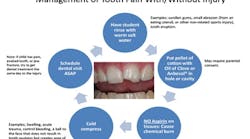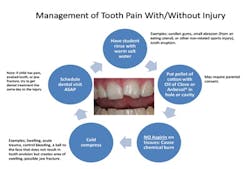How to have a great professional relationship
by Janice Hurley-Trailor, the Image Expert
Working together — experiencing the ultimate in synergy and productivity for the good of the practice — sounds like something from a glossy brochure. Harmony and teamwork sound great in principle, but if you’ve ever struggled to achieve them, you’re not alone. It’s common for practice members to find themselves at odds with others, maybe even feeling alone. Still, we would all agree that it is an optimal goal to really enjoy and respect the people we work with.
How do you feel about the relationship between you and your doctor or doctors? I hope you have everything you ever wanted in these professional relationships. If so, I would guess that one of three things happened:
- You knew what was important to you in choosing your place of employment and you sought that out.
- You were really lucky.
- You’re a person who knows how to get along with others, and you’re almost always able to form positive professional relationships.
I’d like to share a few ideas to make that third option even more likely for you.
When I see great relationships between hygienists and their doctors, I can almost hear Aretha Franklin singing, “R-E-S-P-E-C-T. Find out what it means to me.” Reciprocal respect is the most important factor in having a great relationship with your doctor. So ask yourself these questions — on a scale of one to 10, with 10 being the highest:
- How much do you respect your doctor?
- How much does he or she respect you?
- How much do you respect yourself?
Let’s begin with self-respect. I am a firm believer in the concept that we train others to treat us the way we want to be treated. So if you gave yourself less than a 10 for how much respect your doctor has for you, or how much you respect yourself, let’s work on that first.
Self-respect
Study these questions for a minute:
- Deep down, do you truly love and respect yourself
- Do you walk, talk, and look like you respect yourself
- Do you know what really matters to your doctor in terms of work ethics and expectations? Have you received those expectations in writing
- Do you have the clinical skills your doctor admires
- Are you up-to-date and excited about the areas of dentistry your doctor is interested in
- Do you speak up in a constructive manner when you have an opinion about policies and procedures for the office
- Are you viewed as upbeat and positive by others you work with
If any of those areas could use a little improvement, consider doing one or some of the following:
Take a good look at how others see you. If someone took a candid video of you throughout the day, would your face, your grooming, your posture, and your speech show that you value yourself? Would others perceive you at your very best?
I recently met with Mike Yankoski, author of “Homeless in America,” who as a young college graduate purposely experienced homelessness for five months in six states. He said one surprising outcome was what it did to his self-esteem and his ability to portray self-confidence. Because others had treated him with a lack of respect, even treating him as invisible, he subconsciously started to believe that. And although those five months had been less than 2% of his life, they had a substantial impact on how he projected himself afterward. Sometimes, we, too, have participated in less than supportive relationships, and it has affected how we perceive and project ourselves.
Notice how you talk to yourself. Sometimes, it’s not others who most frequently speak ill of us. It could be our own self-talk that is less than uplifting. John Milton, an English poet, said, “The mind is its own place, and in itself can make a heaven of hell or a hell of heaven.” How many times a day do you undermine yourself with negative thoughts? Is it common for you to think things like this? “I should have done that better.” “That’s so like me to mess it up.” “Here we go again. I knew I’d run late.” “I can’t stand this job.” “Nobody listens to me.” “I hate the way I look.”
Our minds, our thoughts, our self-talk is always on. According to scientists, we have about 60,000 thoughts per day — about one per second every waking hour. The goal isn’t to stop the thinking — which is not possible — but to encourage more positive, loving thoughts toward ourselves.
I promise you that the more you truly respect and like yourself and take good care of yourself, others will follow suit.
Increase your professional confidence. The fact that you’re reading RDH magazine tells me you care about your professionalism and continuing education. Do you have written goals for the next stage of your development? Can you take the next step to make yourself an even more valued member of the team?
Respect for your doctor
Many of you have had long-term professional relationships with your current employer, and have found the experience comparable to a marriage: through thick and thin, in sickness or health, in full schedule or empty schedule. Well, like a marriage, you might need to work at the relationship. And like a marriage, your positive respect can grow over the years.
Begin with your expectations. When I hear a hygienist complain about a doctor’s personality, I reply: “What were you expecting?”
Usually, I hear, “Well, I was expecting that he or she would change.”
“Really? Why?”
The truth is that when it comes to others’ strengths and weaknesses, what you see is what you get. For the most part, adults don’t change. We can only change ourselves — and only when we want to change and choose to work on it. So we create unnecessary stress in our lives when we hold expectations of others. Don’t set yourself up for unhappiness, and don’t set others up to fail in your eyes by expecting them to change.
Focus on the positive. When you set your magnifying glass on all the things you like about your doctor and your teammates, you get more of what you focus on. People tend to keep doing more of the things that are appreciated. They tend to respond in kind when treated kindly. But most importantly, what you focus on becomes your perception, making it a positive experience for you.
This doesn’t mean you can’t clear up misunderstandings or suggest improvements to office systems, but if you get stressed over certain personality traits your doctor already had when you were hired, then give yourself and the other person a break and let it go!
Can you improve your relationship with your doctor? Of course you can — if you want to and if you work on it. And as in any long-term relationship, it can make a difference in your own life for years to come.
Janice Hurley-Trailor, BS, is Dentistry’s Image Expert. Contact her at www.janicehurleytrailor.com.
Past RDH Issues







